Summary:
- Berkshire Hathaway sold nearly half of its Apple shares in Q2, signaling a lack of confidence in Apple in the near term.
- Apple is about to release new Macs with M4 processors and introduce Apple Intelligence, revolutionizing personal computing.
- AI is the next major advance in computer interfaces.
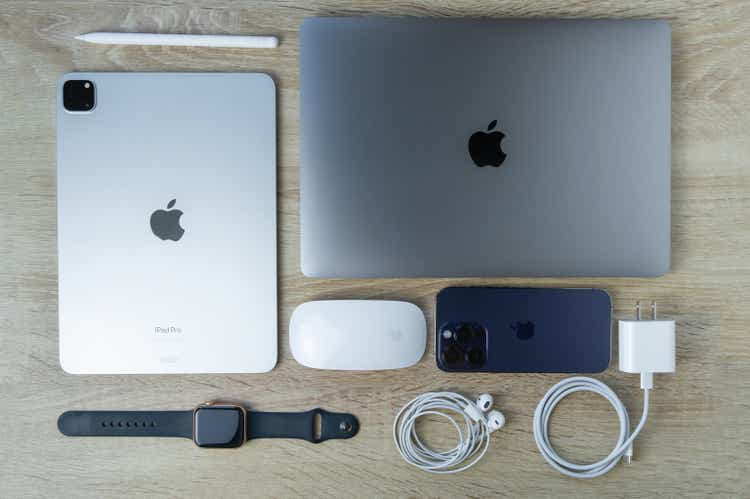
Ake Ngiamsanguan
Warren Buffett’s Berkshire Hathaway (BRK.A) (BRK.B) is widely reported to have sold nearly half of its Apple (NASDAQ:AAPL) shares during Q2. While the sale was undoubtedly profitable, it doesn’t convey a lot of confidence in Apple in the near term. But the timing of the sale may have been less than propitious. Apple’s next-generation Silicon and Apple Intelligence are about to be unleashed, and they will fundamentally change, once again, the way we use personal computers.
Berkshire Hathaway’s 50% cut of Apple holdings may be poorly timed
Berkshire Hathaway reduced its shares in Apple from 789 million to about 400 million in Q2. Still a large stake, but the sale suggests that Buffett thinks this is as good as it gets in the near term.
He might be right, and certainly, Apple’s performance for the last couple of years has been uninspiring. After surging in fiscal 2021 Q1 (2020 December quarter), revenue has plateaued, allowing for the usual seasonal variation:
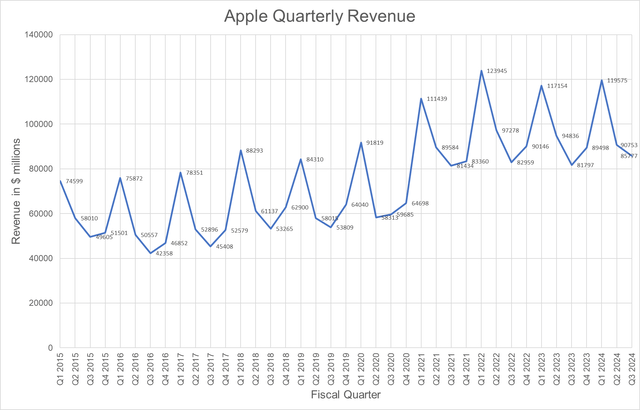
Mark Hibben from Apple filings
The surge in fiscal 2021 Q1 benefited from the first Apple Silicon Macs (using the M1), and the post-COVID consumer splurge on personal computing devices, including iPhone. But while interest in the Mac (and iPad) has waned with the general PC downturn, Apple has mostly been sustained by nearly linear Services growth:
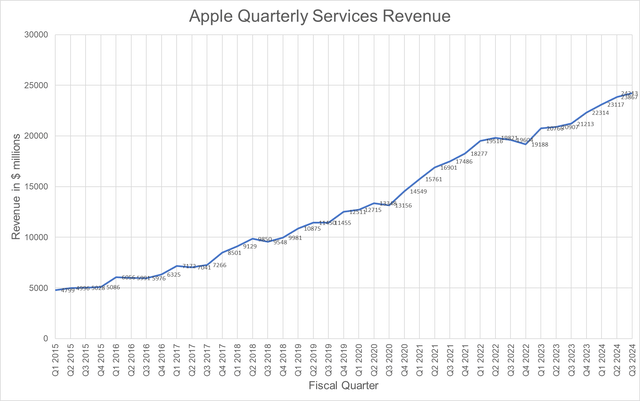
Mark Hibben from Apple filings.
I’d probably take profit along with Buffett if I thought Apple couldn’t break out of its current revenue plateau. But I base my tech company investment decisions primarily on the trajectory of the company’s technology development. This looks at the technology the company is currently working on and where their products will be, based on that technology.
Apple is about to achieve two important milestones in their technology development and product releases. The first is the release of new Macs based on the M4 processor series. The second is the release of new iOS, iPadOS and macOS versions featuring Apple Intelligence.
It seems poor timing to sell ahead of these developments, especially since we already know a good deal about the M4 and its superior performance.
Apple’s superior M4 about to be unleashed
Apple first showed the world the M4 in its new iPad Pros in May:
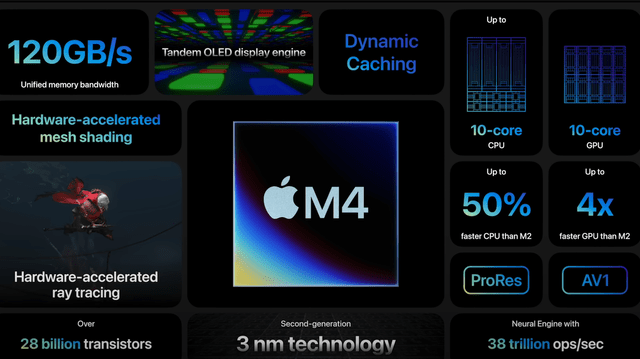
Apple
The raw CPU performance of the M4 is truly remarkable, especially in single core performance, as measured by Geekbench:
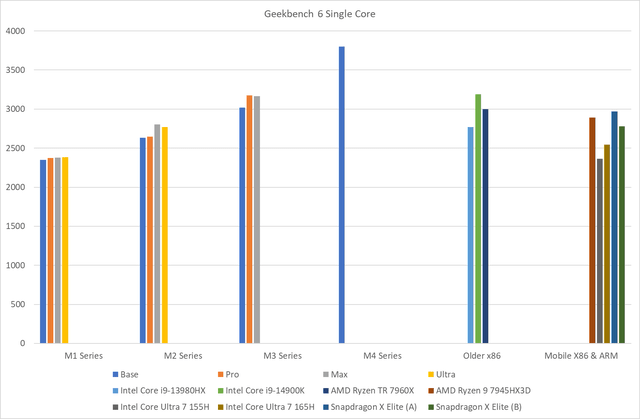
Mark Hibben from Geekbench data.
The base M4 is not endowed with a lot of CPU cores, so it doesn’t tower over its competition in multi-core Geekbench:
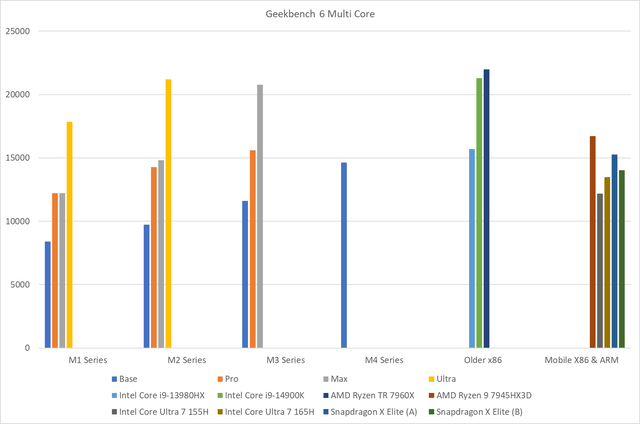
Mark Hibben from Geekbench data.
But the base M4 was meant to be a low-power device, and arguably, it was overkill for the iPad Pro. Higher end versions of the M4, such as the M4 Pro, M4 Max, will have more CPU and GPU cores. Apple’s M series Silicon performance is now at the point where it humiliates desktop x86 processors while consuming a 1/5th of the power.
Ever since the new iPad Pros were announced, I’ve been expecting Apple to release M4 series Macs as soon as possible. There were compelling business reasons for that.
The M4 had proven to be so good that I felt that it would suppress sales of existing M3 and earlier Macs as customers waited for M4 Macs to be released. Furthermore, the release of highly competitive Microsoft (MSFT) Copilot+ PCs based on the Qualcomm Snapdragon X Elite seemed to warrant a response from Apple in the form of M4 Macs.
Yet, Bloomberg’s Mark Gurman had maintained that M4 Macs would not arrive until after the end of the year. Fortunately, we won’t have nearly that long to wait. Gurman revised his timetable in an August 8 post:
Apple Inc. is planning a new version of the Mac mini that will be its smallest desktop computer yet, part of a broader overhaul of the Mac line with AI-focused chips. . .
The updated mini is one of several new Macs coming over the next several months. [Bold face mine] The company is preparing versions of the iMac desktop and MacBook Pro with chips from the M4 line, also for as early as this year. There are MacBook Airs in development for the spring, and Mac Pro and Mac Studio models are planned for the middle of next year.
The mass upgrade to the M4 processor marks another milestone for Apple: It’s the first time the company is putting the same chip generation in all its Macs. The M4 silicon — already featured in the iPad Pro — is meant to power new artificial intelligence features that Apple is beginning to roll out later this year.
The exact time frame for the M4 Mac rollout is still a little vague, but it appears to be over the December quarter and could start as early as September for base M4 models.
Apple Intelligence to bring the AI revolution to Apple devices
Often, when Apple has introduced a superior processor, analysts have just rolled their eyes and asked, “Do consumers really need or want all that power?”. The thesis that a computer can offer too much computing power has been consistently contradicted by the applications that are developed for it.
Developers always seem to find ways to use up the available computing power of the device. It’s kind of a Parkinson’s Law of computing: applications expand to fill the available computing performance space. This is true of games, which continue to test the limits of the fastest consumer devices, and it will be particularly true for AI apps.
Indeed, it’s clear that the most powerful AI applications such as ChatGPT can’t run on a personal computer at all. As I discussed in The Apple Vs. Microsoft AI Matchup, both Microsoft and Apple are working to bring a mixture of cloud based and on-device AI to their next-generation devices.
Squeezing generative AI models into little portable devices is non-trivial, and here I think Apple has the edge with its superior performing Silicon. This includes the Mac, iPad, and iPhone.
Apple has been building AI accelerators into its M-series processors from the beginning, and Apple is going to make all Apple Silicon Macs compatible with Apple Intelligence. Apple Intelligence features will begin to roll out with the next macOS release, Sequoia, due about September.
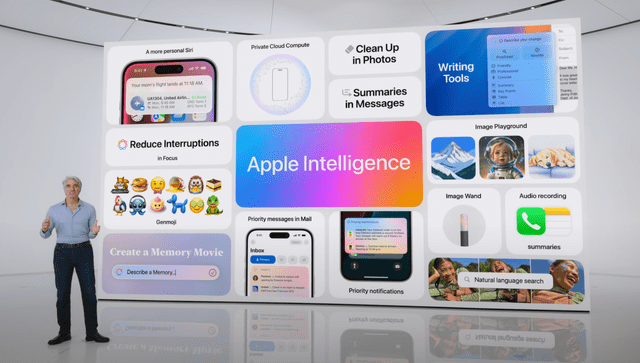
Apple
Research firm Canalys has pointed out that Apple is currently shipping the most “AI capable” personal computers:
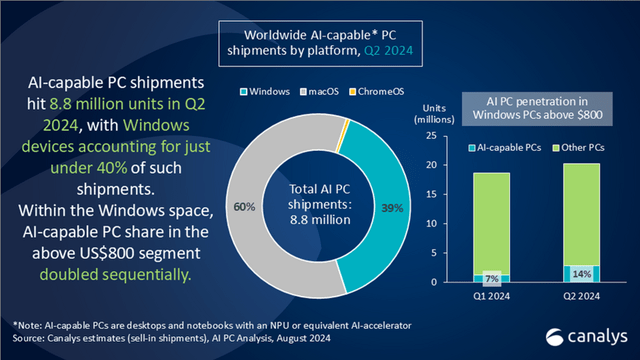
Canalys
When all existing M-series Macs are included, Apple will have by far the largest base of “AI capable” PCs. Where Apple lags behind Microsoft, is in software. And everyone realizes this. During Apple’s fiscal Q3 earnings call, CEO Tim Cook acknowledged that Apple Intelligence features would roll out slowly:
Our objective that we said in June is to roll out US English starting in the fall and that is to users, and then proceed with more functionality, more features, if you will, and more languages and regions coverage as we proceed across the next year. And so we sort of gave a time frame that — and we’re tracking to that.
But Apple has another advantage that largely compensates. Apple Intelligence will come not merely to the Mac, but also iPads with M-series processors, Vision Pro, iPhone 15 Pro, and future iPhones.
Investor takeaways: this is the calm before the storm
There’s no shortage of analysts claiming that AI is over-hyped. I wouldn’t disagree, but I think they’re missing the point. Yes, as subject matter experts, generative AIs leave something to be desired.
Where I think the AI becomes truly useful is as the expert of its own host device. Here, the knowledge base doesn’t need to be as extensive. The on-device AI will monitor device functions, health and security. The AI will help find files, provide reminders, etc.
It will mediate any of the functions of the personal computer through normal speech interactions with the user. Think of the AI as a nice HAL 9000, with less responsibility.
In short, AI is the next major advance in computer interfaces. For the first time ever, it will be practical to talk to our computers in order to get them to do what we want. We’ll still be able to use any other user interface feature that we want, such as mice or keyboards, but gradually, speech will become the principal means of interaction.
We are poised on the eve of this next computing revolution, to which Microsoft, Google (GOOG), and Apple will contribute in a healthy competition. Is this the right time to sell Apple? I certainly want to wait to see what Apple brings forth in the next year. I remain long Apple and rate it a Buy.
Analyst’s Disclosure: I/we have a beneficial long position in the shares of AAPL, MSFT either through stock ownership, options, or other derivatives. I wrote this article myself, and it expresses my own opinions. I am not receiving compensation for it (other than from Seeking Alpha). I have no business relationship with any company whose stock is mentioned in this article.
Seeking Alpha’s Disclosure: Past performance is no guarantee of future results. No recommendation or advice is being given as to whether any investment is suitable for a particular investor. Any views or opinions expressed above may not reflect those of Seeking Alpha as a whole. Seeking Alpha is not a licensed securities dealer, broker or US investment adviser or investment bank. Our analysts are third party authors that include both professional investors and individual investors who may not be licensed or certified by any institute or regulatory body.
Consider joining Rethink Technology for in depth coverage of technology companies such as Apple.
